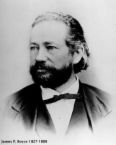IN MEMORIAM

JAMES P. BOYCE
(1827-1888)When a great and deeply-imbedded oak falls to the ground the shock is felt throughout the forest. When a tower that has stood as a landmark and a rallying center totters to its fall, a sense of desolation fills the heart of those accustomed to its presence. When a man of surpassing eminence, who by his life and his powers, has rooted himself in the affections of his brethren, has become a center of influence and intellectual force, his passing away not only shocks and awakens a feelings of desolation; but also flings over the heart a mournful sadness, impressive in its silence or expressed in tearful words.
Such a man was James P. Boyce, and such were the feelings, wide-spread and deep, when there flashed over the wires that, in the midst of his family, but in a far-off land, and strangers who knew not how great and true and loved a man he was - he had calmly, trustingly, hopefully gone from his labors to his rest, from the darkness to the day, from the hour of prayer to the eternity of praise, from the scenes of conflict to the throne of victory.
A grand man was James P. Boyce, formed after an antique mould, calm and elevated in the repose of his faith, resting in the everlasting covenant and promise of the Eternal. Unmoved by the changing currents of thought and action in the busy scenes in which he was an actor -- firm as a rock in his theology and principles, he was yet of that modern type of
[p. 157]
American Christian energy which takes hold of every consistent means to elevate manhood and advance the thought and the activities of God's people; clinging with soul-grasp to the inspiration of God's Word, its simple teachings and ordinances, in the efficacious power of God's Spirit and God's truth in the quickening and salvation of the human spirit, without human adornments, he nevertheless held that the highest manly culture, the widest range of knowledge, the fullest, brightest of accomplishments were to be sought for, attained and applied in the Christian ministry and churches.Gentle as a woman, he was as strong as a giant. Simple as a child, he was a profound philosopher and theologian.
We knew him well and loved him dearly. We first met him in Louisville, Kentucky, in 1857. He was then in the glow of early manhood. Raised in affluence, the heir of wealth, he had graduated at Brown's University, and at the Theological Department of Princeton, and given himself to the work of the ministry. He was then pastor at Columbus, S. C. He had been baptized by Dr. Richard Fuller in 1846, and ordained to the ministry in 1855, and immediately became professor of theology in the Furman University. The Southern Theological Seminary originating in his own heart and brain was brought forward in the convention that then met at Louisville. He was the soul of the movement. He gave liberally of his means toward it. We remember Dr. Manly, Sr., saying at our own table during the convention, that "James P. Boyce needed a guardian to keep him from giving away his whole estate to the Theological Seminary." And never did the lofty conception wane in his mind. He pursued it through all changes, calamities, discouragements, as the goal of his life. We traveled with him through various portions of Kentucky and Tennessee, wonder-struck at the calmness yet intensity of his purpose to endow that institution and move it to Louisville. God blessed his efforts, his energies, his lofty purpose. His life work succeeded. He lived to see the endowment almost completed, and an imposing, commodious structure erected for the Seminary. Sixty-two years mark the boundary of this man's life-work, nearly forty of it were given to the cause of an educated rising ministry. He sunk beneath the toil, not in defeat, but in glorious victory, and his name and his memory will be honored while American Baptists have a record.
NOBLE BROTHER, MAN OF GOD, VICTOR IN THE BATTLE, FARE-THEE-WELL.
EDITORIAL
By Samuel H. FordThe funeral of Dr. J. P. Boyce took place at Louisville, Sunday, Jan'y 20th. It was a solemn and memorable occasion. There were present, in addition to the pastors of Louisville, and the teachers and students of the Seminary, Brethren J. M. Pendleton, Wm. M. Pratt, Lansing Burrows, of Ga., J. T. Tichenor, Dr. Dudley, President of the Georgetown College, J. L. M. Curry, of Virginia, James C.[A.?] Kirtley, W. H. Williams, of the Central Baptist, the editor of the Repository, and many others. Addresses were delivered by Dr. John A. Broaddus, his life-long friend and co-laborer, -- an address never to be forgotten by those who heard it; also, by Judge Humphries, of Louisville, whose father and Dr. Boyce were intimate friends, and then by Dr. Curry, plaintive, yet powerful. We were glad that we had the opportunity of showing our regard for the memory of the deceased one by being present on the occasion.
======= [Samuel H. Ford, editor, The Christain Repository, February, 1889, pp. 156-158. Scanned and formatted by Jim Duvall.]
More on James P. Boyce
Baptist History Homepage